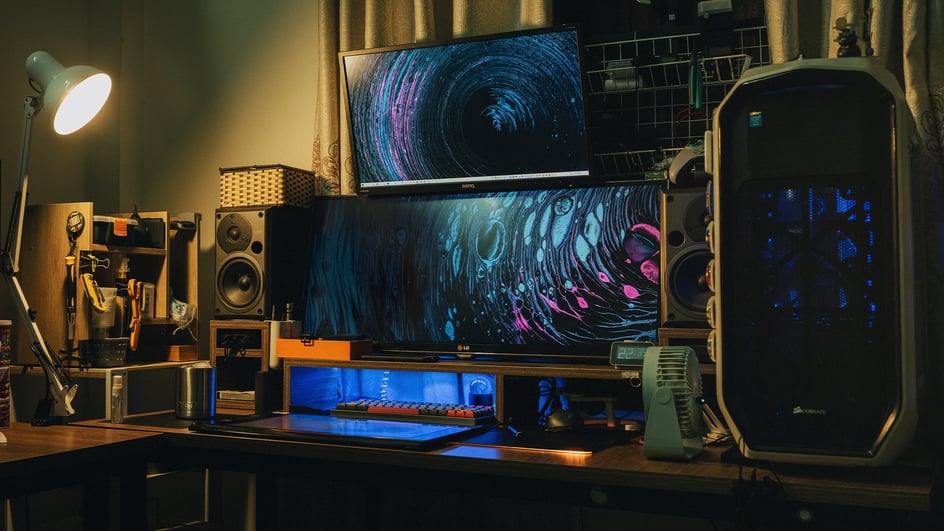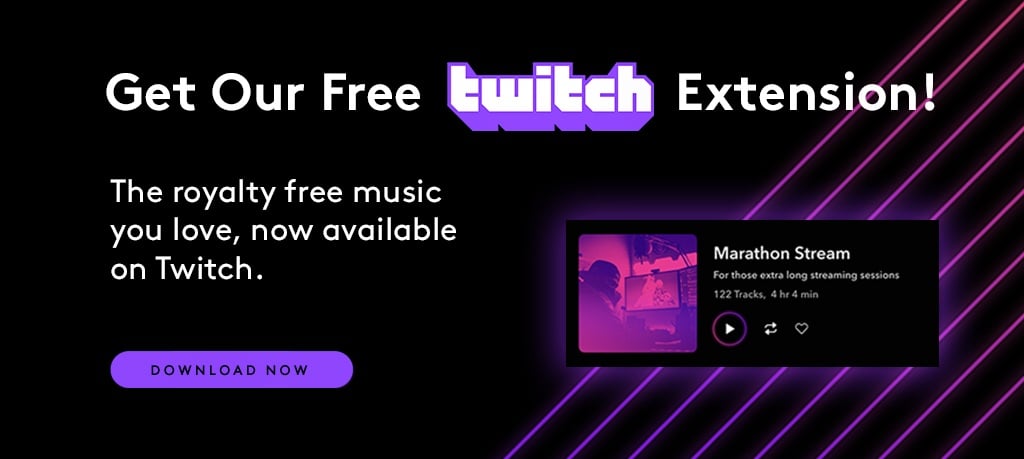
Jun 3, 2021
*Updated July 2022
Twitch has become a powerhouse in the social space, bringing communities together around the hobbies and content creators that they love.
As a new entertainment hub, Twitch is attracting everyone from established celebrities to unknown gamers and giving them a platform to build a unique audience. They all want to know the secret to becoming a successful streamer.
But Twitch wasn’t always an established juggernaut online. In fact, Twitch spent its first decade of life as a “wild west” for different types of content. And if there were rules, nobody seemed all that interested in upholding and enforcing them.
Unfortunately, that has started to change in the past two or three years.
Companies are finally paying attention to Twitch and looking to piggyback off its success. Or, more specifically, they are looking to claim a chunk of the ad revenue that is the dream of every aspiring streamer.
One particular area of conflict and confusion has been on music licensing and streamers’ understanding of how to play music on Twitch.
Twitch music rules overview
Twitch has become a huge platform for content creators to build a community and find some success. From the Partner Program to sponsorships, people have learned the ins and outs of turning an audience into a loyal fanbase.
But figuring out how to play music on Twitch isn’t as clear cut. It’s become an obstacle for a lot of streamers, and some of the rules (and specifically how they are enforced) continue to evolve.
There are pretty clear rules about using music on Twitch, and you can find them directly on Twitch’s site. But while the platform explains what music content streamers can’t use, they aren’t quite as forthcoming about which songs are safe to include on a stream.
Fortunately, we've created this guide to clear that up.
What music can you play on Twitch livestreams?
According to Twitch's music rules, there are three kinds of music content you can use in your streams:
-
Original music that you own the copyright for.
-
Copyrighted music that you have licensed.
-
Music for vocal performances on Twitch Sings.
And that’s it.
No adding background music to your intro or streaming music from streaming services. You can’t use 30 seconds of any song, or re-stream a radio broadcast. In fact, you can't even stream music owned by you (aka .mp3 files that you’ve purchased and downloaded).
None of those things get around copyright law, and none of them include a magic loophole you can exploit.
To clarify even more, let's address a few common FAQs about how to play music on Twitch.
Can I play Spotify music on Twitch?
Even when you have a Spotify subscription, this doesn't give you the green light to play Spotify music during a Twitch stream. This music is intended only for personal use, so you're bound to face a DMCA claim if you stream with Spotify.
Also, this applies to any music streaming service: Apple Music, Pandora, Amazon, etc.
What if I purchased music files?
You may think that any songs you purchase would count as music owned by you...but that's not true. Similar to playing music on Spotify, any song that you purchase and download is technically for your personal use only. Unless it's music licensed by you for a video project, you'll still face a DMCA strike if you use a song on a Twitch stream.
Can I get banned on Twitch for playing music?
The short answer is yes. If you still try to play copyrighted music without a license, you’re opening yourself up to having Twitch take down your streams, temporarily ban your channel, or — in a worst case scenario — offer you up on a platter to a team of lawyers from a big record label.
How can I stream music on Twitch without getting a DMCA claim?
As long as you have the legal rights to play copyrighted music, you can avoid DMCA claims when using music in a Twitch stream. Music without copyright is extremely rare, but you can avoid paying a lot of extra licensing and royalty fees by using royalty free music instead.
Dealing with copyrighted music
When it comes to playing copyrighted music in Twitch streams, a lot of people take the “better to ask forgiveness than ask permission” stance. And that might make sense, given that the Twitch music rules can be a little confusing.
But with copyright holders starting to go after big content creators, that’s not a risk you want to take.
Of course, it would help if music copyright law was simple and well-known. But the reality isn’t quite as clear-cut. Twitch is still in the process of figuring out its music rules and how to enforce them, so that makes music licensing a complicated topic for any streamer that wants to use music in their streams.
In other words, it’s something every streamer needs to be aware of.
You can’t afford to just add music from your favorite Spotify playlist to a Twitch stream. And in some cases you can’t even include the licensed music used in the games you’re playing. That’s because any piece of music can be flagged for copyright infringement, and record labels and musicians have used this rule to strong-arm Twitch into taking action.
From quietly deleting thousands of videos (due to music copyright issues) to handing out bans, Twitch has started to treat music copyright seriously to avoid legal action against them.
Unfortunately, Twitch uses algorithms to sniff out copyright infringement. And if you’ve seen a Terminator movie, you know that means there’s nowhere to hide. There are even instances of streamers getting banned by Twitch completely by mistake.
Pro tip: For what it's worth, this is a problem that content creators are facing everywhere. Even the most popular channels on YouTube — like Lofi Girl and Totally Not Mark — can fall victim to false copyright claims. Your Twitch streams are no exception.
While it isn’t an ideal situation for anyone, the only way to avoid Twitch content strikes and Digital Millennium Copyright Act (or DMCA) claims is to follow the rules. So it’s your responsibility to protect yourself, your content, and your channel.
(To get a better idea of your licensing options, check out this blog post.)
How to play music on Twitch
All of these changes to Twitch’s music policy have pushed people to find new ways to insert music on their channels and improve their Twitch audio setup. And one of the easiest ways is with royalty free music.
The worst case scenario is that you individually license the songs and use them as often as you want, although some companies give you access to an entire royalty free music library for a single monthly subscription.
But you can also find some music libraries and playlists that you can stream directly to Twitch. That might be the most copyright- and streamer-friendly way to get access to a music catalog without having to worry about a legal team tracking you down or taking down your content.
For example, Soundstripe’s Twitch plugin gives you access to curated playlists of radio-quality songs that you can safely use in a Twitch stream. And it’s integrated directly into your channel so you never have to worry about playing music you don’t have the right to stream.
The only challenge you should have to think about is what songs or playlists your audience will enjoy. Maybe you want to find music that matches the tone of the game you’re playing. Or maybe you want something that gets your adrenaline pumping.
Either way, don’t stress out about where you get your music and whether or not the Twitch music algorithm is coming for you. Instead, think about which curated playlist you want your viewers to listen to while you explore new worlds and dominate competitive matches.
Finding out how to play music on Twitch streams is a power move. Radio-quality music — like sponsored banner ads — can give your streams a professional vibe. And if you do your research, you can accomplish that without having to worry about copyright infringement or content claims in your immediate future.
Because building a Twitch community is hard enough. And that’s especially true if you are trying to build towards becoming a Twitch Affiliate and eventually joining the Partner Program.
For unlimited access to over 20 royalty free playlists (aka 200+ hours of stream-friendly royalty free music), check out our Twitch Pro plan.
After all, who doesn’t want to make money as a Twitch streamer?
Further reading
If you found something useful in this guide, here are some other resources and tips for Twitch streamers and other content creators:
